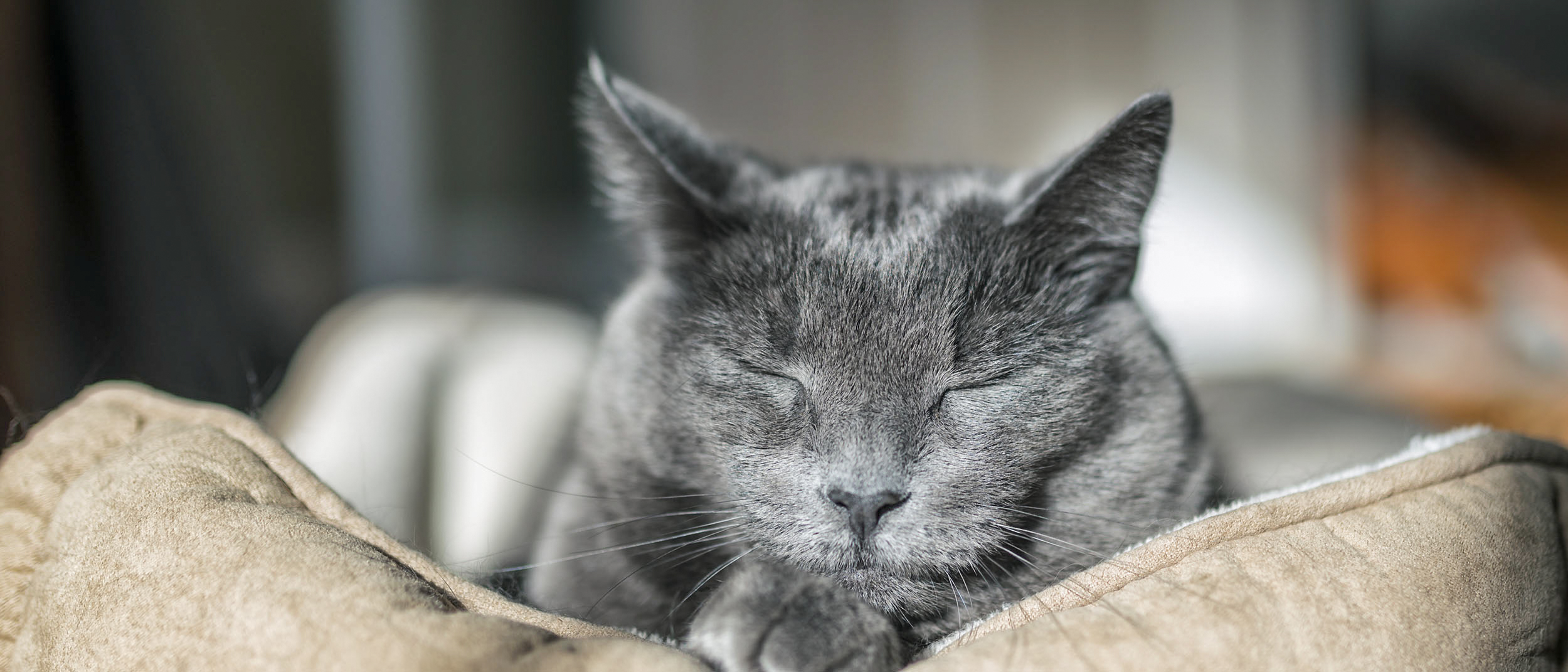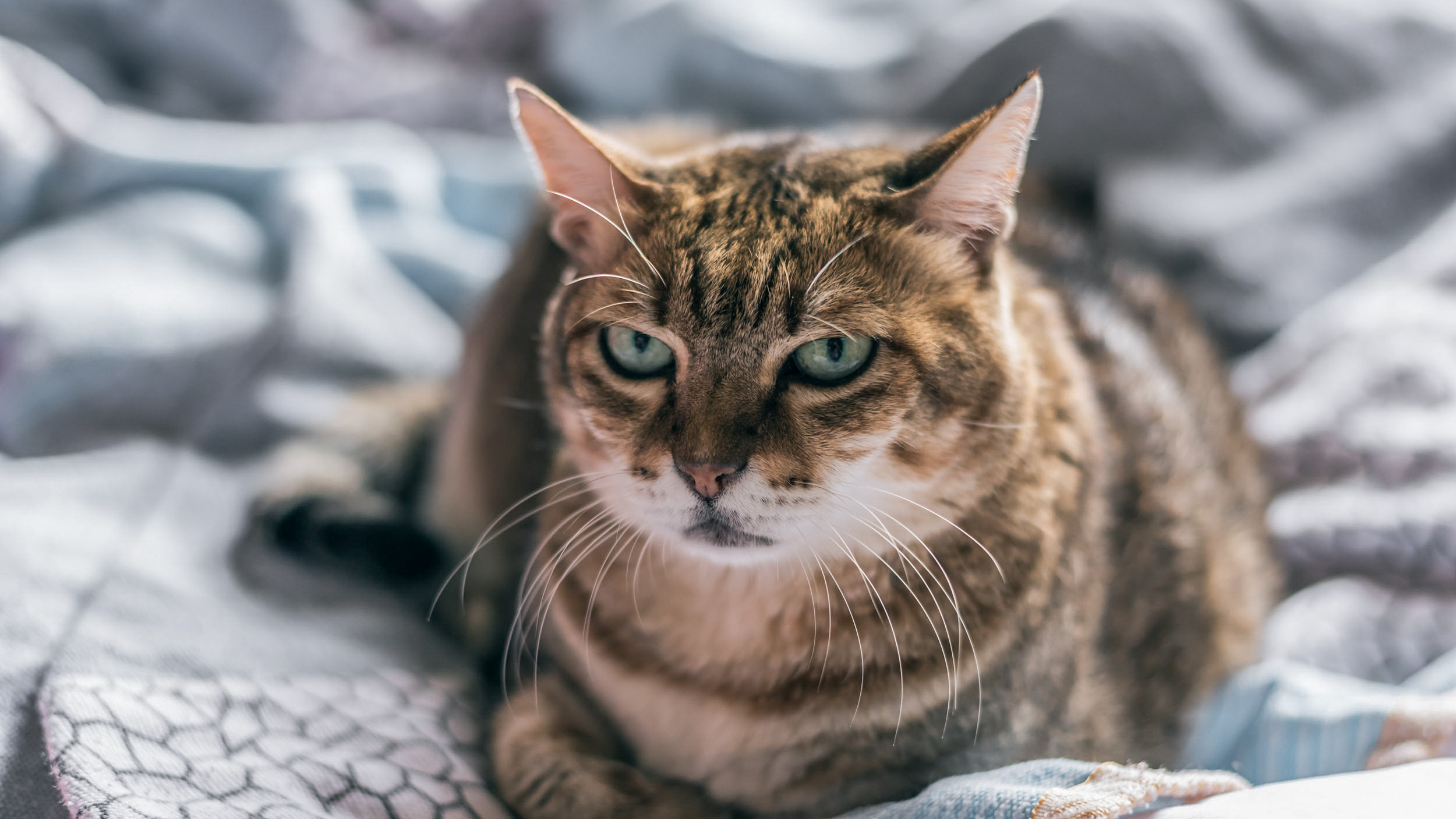How should I care for my ageing cat
Article

Each stage of your cat’s life brings with it unique joys and challenges, particularly as they reach their senior years. Their behavioural and physical changes from the age of 10 onwards means you may have to change their environment, exercise and diet to support them in the latter part of their life.
Cats tend to live for 15 years on average, but it’s not uncommon for a cat to live to 20 years old – the equivalent of a 96-year-old human. Usually from around 11 years of age, you’ll start to notice external signs of ageing in your cat, and their nutritional requirements will also change.
Your cat's age in human years
Just as with humans, the ageing process is an individual experience and different cats will show signs of ageing at different times. However, in general your cat’s body will start to show the first signs of ageing at a cellular level at seven years old – but you won’t be able to see any outward symptoms until your cat is about 12 years old. From this point on, the cells in their body are slowing down and their bodily functions are less effective, including their heart and immune system.
The veterinary classification of your cat’s age is:
At seven to 10 years, your cat is mature
At 11 to 14 years, it’s considered senior
From 15 years upwards, it is classified as geriatric
To understand this in terms of human years, a 10-year-old cat would be the equivalent of a 56-year-old human. It’s not uncommon for cats to live up to 20 years – that’s the same as a 96-year-old human.
The signs of ageing in your cat
The signs of ageing in your cat
Although each individual cat will display signs of ageing differently, there are some common ageing processes which happen to every cat. Their smell, taste and hearing become less acute, which has an impact on their appetite. This can also be affected by dental issues, such as the teeth showing wear, gum disease or tooth loss. A combination of these problems can then lead to weight loss.
Their joints are less flexible, especially if affected by osteo-arthritis, which can result in severe pain and mobility issues. This inflexibility also affects their ability to groom themselves properly, which in turn has an impact on their coat and skin. The coat itself may become whiter and you might see decline in its quality as the sebaceous glands – which produce nourishing oils for the skin – are less productive. The natural ability to produce an immune response tends to decrease with age, exposing the cat to more risks of infection and disease. Several metabolic processes like digestion are also altered as the ability to process fats and proteins decreases as the cat grows older.
Senior cats may exhibit altered behaviours including a lack of interaction or making noises at unsociable times. They may sleep more, but less deeply, which can interrupt their routine and cause behavioural issues.
Your ageing cat’s environment
As your cat ages, their joints can start to wear down and they may begin to suffer from arthritis. They may become less mobile, unsteady on their feet, or struggle to get up and down from their favourite spots.
You can care for your ageing cat by providing ramps or stairs to high places they like to perch on, and making their bedding particularly comfortable so they are able to rest easily. A litter box with shallower sides can be helpful for older cats to reduce the strain of getting in and out.
Making their food, litter box and fresh water easily accessible – for example, by having these on each floor of your home – can also decrease any strains and stresses on their system. You should also avoid changing any aspects of their routine as this can aggravate any cognitive difficulties they might be having.
Exercising and grooming your ageing cat
Painful or sensitive joints can cause your cat to move less and be less willing to come when you call them. If they are in pain, they may also react badly to being picked up, and older cats often suffer with cognitive impairments which can cause them to behave unsociably.
However, exercising your ageing cat is important to maintain a healthy weight. Encouraging them to play gently during the day with their favourite toy can be an easy way to exercise them, and can help them establish a better sleep cycle by tiring them out in the day.
Decreased flexibility can mean older cats are less able to groom themselves properly, so it’s important you regularly brush them to remove dead hairs and keep their skin healthy.

What impact does the ageing process have on your cat’s nutritional needs?
Because your cat’s physical abilities are changing, it needs different nutrition from any other time in its life.
It now takes their digestive system more effort to digest and absorb nutrients from their foods, particularly fat and protein. Dental and digestive issues also mean your cat might find it hard to eat or chew the food it’s previously consumed, so softer, mousse-like textures can be easier for them to eat.
A decreased ability to smell and taste can affect appetite, so their food needs to be particularly palatable so they’re more likely to eat it and therefore continue to get the nutrients they need.
Your ageing cat and their diet
Specific nutrients should be part of your older cat’s diet to alleviate any symptoms of ageing and slow the onset of age-related diseases:
- Glucosamine, chondroitin sulfate and EPA/DHA, together with green-lipped mussel extract, help to increase mobility in ageing cats and promote healthy joint function
- Antioxidants to support antioxidant capacity
- Reduced levels of phosphorus to support kidney health and function
- Highly digestible protein to support digestion in mature cats. Beet pulp for a beneficial prebiotic effect, and EPA/DHA to help maintain digestive health
Learn more about what older cats need from their diet.
Symptoms of illness in senior cats
Sometimes, these symptoms in an older cat aren’t simply a sign of ‘getting older’; they may also be a symptom of a bigger problem.
Cats tend to hide any illness, limiting their movement or activity which may exacerbate the problem, rather than indicating pain through noticeable signs such as limping or making noise. For this reason, it’s important to take note of any subtle changes in their behaviour – such as refusing to eat or no longer jumping up to their favourite spot – and take them to your vet for a check-up.
There are some common symptoms to look out for in a senior cat which may indicate an underlying issue:
- Loss of appetite or weight, which can indicate a digestive issue
- Increased urination or thirst; potentially a sign of urinary problems
- Stiffness, limping or difficulty getting up, which may be arthritis
- Appearing disoriented, anxious, or exhibiting unusual behaviour
By making sure you visit your vet regularly, you’ll be able to catch any serious conditions before they develop and ensure you provide the best care possible for your senior cat.
Visiting the vet with your ageing cat
After your cat is 10 years old, it’s best to visit your vet every six months; this way, any potential illnesses can be spotted quickly. If you notice your cat has increased thirst or urination, problems related to their digestion, significant mobility issues, behavioural changes or any lumps on their body, make sure to visit your vet straight away as these can be indicators of underlying diseases.
By following these simple tips, you’ll be able to support your cat as it approaches its later years. If you’re in any doubt, consult your vet who will be happy to give you all the help you need when caring for older cats.
Related Articles
Like & share this page